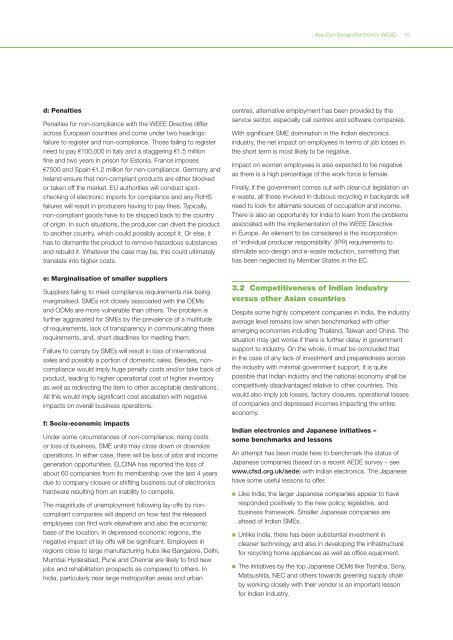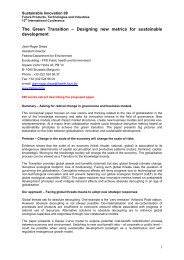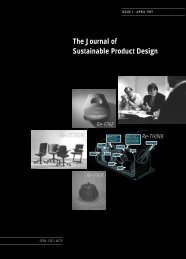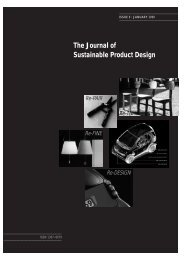Country report on the Indian electronics sector - The Centre for ...
Country report on the Indian electronics sector - The Centre for ...
Country report on the Indian electronics sector - The Centre for ...
You also want an ePaper? Increase the reach of your titles
YUMPU automatically turns print PDFs into web optimized ePapers that Google loves.
d: Penalties<br />
Penalties <strong>for</strong> n<strong>on</strong>-compliance with <strong>the</strong> WEEE Directive differ<br />
across European countries and come under two headings:<br />
failure to register and n<strong>on</strong>-compliance. Those failing to register<br />
need to pay 100,000 in Italy and a staggering 1.5 milli<strong>on</strong><br />
fine and two years in pris<strong>on</strong> <strong>for</strong> Est<strong>on</strong>ia. France imposes<br />
7500 and Spain 1.2 milli<strong>on</strong> <strong>for</strong> n<strong>on</strong>-compliance. Germany and<br />
Ireland ensure that n<strong>on</strong>-compliant products are ei<strong>the</strong>r blocked<br />
or taken off <strong>the</strong> market. EU authorities will c<strong>on</strong>duct spotchecking<br />
of electr<strong>on</strong>ic imports <strong>for</strong> compliance and any RoHS<br />
failures will result in producers having to pay fines. Typically,<br />
n<strong>on</strong>-compliant goods have to be shipped back to <strong>the</strong> country<br />
of origin. In such situati<strong>on</strong>s, <strong>the</strong> producer can divert <strong>the</strong> product<br />
to ano<strong>the</strong>r country, which could possibly accept it. Or else, it<br />
has to dismantle <strong>the</strong> product to remove hazardous substances<br />
and rebuild it. Whatever <strong>the</strong> case may be, this could ultimately<br />
translate into higher costs.<br />
e: Marginalisati<strong>on</strong> of smaller suppliers<br />
Suppliers failing to meet compliance requirements risk being<br />
marginalised. SMEs not closely associated with <strong>the</strong> OEMs<br />
and ODMs are more vulnerable than o<strong>the</strong>rs. <strong>The</strong> problem is<br />
fur<strong>the</strong>r aggravated <strong>for</strong> SMEs by <strong>the</strong> prevalence of a multitude<br />
of requirements, lack of transparency in communicating <strong>the</strong>se<br />
requirements, and, short deadlines <strong>for</strong> meeting <strong>the</strong>m.<br />
Failure to comply by SMEs will result in loss of internati<strong>on</strong>al<br />
sales and possibly a porti<strong>on</strong> of domestic sales. Besides, n<strong>on</strong>compliance<br />
would imply huge penalty costs and/or take back of<br />
product, leading to higher operati<strong>on</strong>al cost of higher inventory<br />
as well as redirecting <strong>the</strong> item to o<strong>the</strong>r acceptable destinati<strong>on</strong>s.<br />
All this would imply significant cost escalati<strong>on</strong> with negative<br />
impacts <strong>on</strong> overall business operati<strong>on</strong>s.<br />
f: Socio-ec<strong>on</strong>omic impacts<br />
Under some circumstances of n<strong>on</strong>-compliance, rising costs<br />
or loss of business, SME units may close down or downsize<br />
operati<strong>on</strong>s. In ei<strong>the</strong>r case, <strong>the</strong>re will be loss of jobs and income<br />
generati<strong>on</strong> opportunities. ELCINA has <str<strong>on</strong>g>report</str<strong>on</strong>g>ed <strong>the</strong> loss of<br />
about 60 companies from its membership over <strong>the</strong> last 4 years<br />
due to company closure or shifting business out of electr<strong>on</strong>ics<br />
hardware resulting from an inability to compete.<br />
<strong>The</strong> magnitude of unemployment following lay-offs by n<strong>on</strong>compliant<br />
companies will depend <strong>on</strong> how fast <strong>the</strong> released<br />
employees can find work elsewhere and also <strong>the</strong> ec<strong>on</strong>omic<br />
base of <strong>the</strong> locati<strong>on</strong>. In depressed ec<strong>on</strong>omic regi<strong>on</strong>s, <strong>the</strong><br />
negative impact of lay offs will be significant. Employees in<br />
regi<strong>on</strong>s close to large manufacturing hubs like Bangalore, Delhi,<br />
Mumbai Hyderabad, Pune and Chennai are likely to find new<br />
jobs and rehabilitati<strong>on</strong> prospects as compared to o<strong>the</strong>rs. In<br />
India, particularly near large metropolitan areas and urban<br />
Asia Eco-Design Electr<strong>on</strong>ics (AEDE) · 15<br />
centres, alternative employment has been provided by <strong>the</strong><br />
service <strong>sector</strong>, especially call centres and software companies.<br />
With significant SME dominati<strong>on</strong> in <strong>the</strong> <strong>Indian</strong> electr<strong>on</strong>ics<br />
industry, <strong>the</strong> net impact <strong>on</strong> employees in terms of job losses in<br />
<strong>the</strong> short term is most likely to be negative.<br />
Impact <strong>on</strong> women employees is also expected to be negative<br />
as <strong>the</strong>re is a high percentage of <strong>the</strong> work <strong>for</strong>ce is female.<br />
Finally, if <strong>the</strong> government comes out with clear-cut legislati<strong>on</strong> <strong>on</strong><br />
e-waste, all those involved in dubious recycling in backyards will<br />
need to look <strong>for</strong> alternate sources of occupati<strong>on</strong> and income.<br />
<strong>The</strong>re is also an opportunity <strong>for</strong> India to learn from <strong>the</strong> problems<br />
associated with <strong>the</strong> implementati<strong>on</strong> of <strong>the</strong> WEEE Directive<br />
in Europe. An element to be c<strong>on</strong>sidered is <strong>the</strong> incorporati<strong>on</strong><br />
of ‘individual producer resp<strong>on</strong>sibility’ (IPR) requirements to<br />
stimulate eco-design and e-waste reducti<strong>on</strong>, something that<br />
has been neglected by Member States in <strong>the</strong> EC.<br />
3.2 Competitiveness of <strong>Indian</strong> industry<br />
versus o<strong>the</strong>r Asian countries<br />
Despite some highly competent companies in India, <strong>the</strong> industry<br />
average level remains low when benchmarked with o<strong>the</strong>r<br />
emerging ec<strong>on</strong>omies including Thailand, Taiwan and China. <strong>The</strong><br />
situati<strong>on</strong> may get worse if <strong>the</strong>re is fur<strong>the</strong>r delay in government<br />
support to industry. On <strong>the</strong> whole, it must be c<strong>on</strong>cluded that<br />
in <strong>the</strong> case of any lack of investment and preparedness across<br />
<strong>the</strong> industry with minimal government support, it is quite<br />
possible that <strong>Indian</strong> industry and <strong>the</strong> nati<strong>on</strong>al ec<strong>on</strong>omy shall be<br />
competitively disadvantaged relative to o<strong>the</strong>r countries. This<br />
would also imply job losses, factory closures, operati<strong>on</strong>al losses<br />
of companies and depressed incomes impacting <strong>the</strong> entire<br />
ec<strong>on</strong>omy.<br />
<strong>Indian</strong> electr<strong>on</strong>ics and Japanese initiatives –<br />
some benchmarks and less<strong>on</strong>s<br />
An attempt has been made here to benchmark <strong>the</strong> status of<br />
Japanese companies (based <strong>on</strong> a recent AEDE survey – see<br />
www.cfsd.org.uk/aede) with <strong>Indian</strong> electr<strong>on</strong>ics. <strong>The</strong> Japanese<br />
have some useful less<strong>on</strong>s to offer.<br />
f Like India, <strong>the</strong> larger Japanese companies appear to have<br />
resp<strong>on</strong>ded positively to <strong>the</strong> new policy, legislative, and<br />
business framework. Smaller Japanese companies are<br />
ahead of <strong>Indian</strong> SMEs.<br />
f Unlike India, <strong>the</strong>re has been substantial investment in<br />
cleaner technology and also in developing <strong>the</strong> infrastructure<br />
<strong>for</strong> recycling home appliances as well as office equipment.<br />
f <strong>The</strong> initiatives by <strong>the</strong> top Japanese OEMs like Toshiba, S<strong>on</strong>y,<br />
Matsushita, NEC and o<strong>the</strong>rs towards greening supply chain<br />
by working closely with <strong>the</strong>ir vendor is an important less<strong>on</strong><br />
<strong>for</strong> <strong>Indian</strong> industry.
















